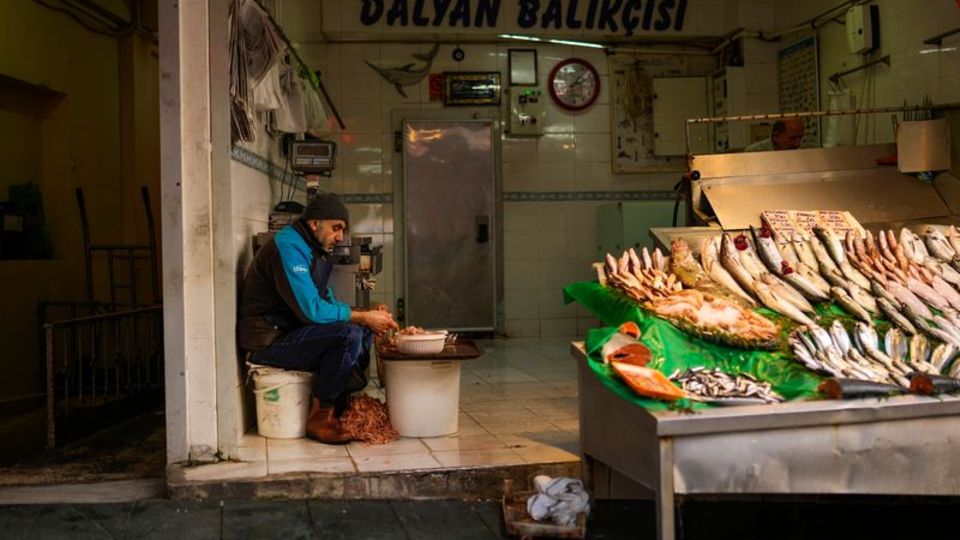Since long, the global economic crisis of imperialism has been particularly noticeable in Turkey through the decline of the Turkish currency, the lira. In recent years, in response to overproduction, the government has always maintained an extremely low key interest rate in order to stimulate crisis-ridden bureaucratic capitalism - which is driven by the imperialists shifting the crisis onto the oppressed nations (impressive evidence of this: every week there are strikes, protests, etc. in Turkish factories of foreign corporations or subcontractors against mass layoffs) - through more investment, causing massive inflation. What is, of course, once again presented in the German bourgeois press as the sole fault of Erdogan's "stupidity" and "stoic egoism" is simply the way the ruling faction of the big bourgeoisie - and they are not mere "fools" - thinks is best to contain / delay the crisis in the country; and this shows how deeply the crisis has already progressed.
In mid-December, the lira lost 6.5 percent of its value in a single day. The weakness of the currency has caused the prices, particularly of imported products, to rise rapidly. Last December, inflation was 36 percent (compared to the previous year); according to bourgeois media, the "unofficial inflation rate" is much higher. In addition to the consequences for the deepest and broadest masses, who are the main victims of the crisis, many from wealthier segments of the population are also losing their positions and sliding into poverty.
Across the country, student living conditions are deteriorating; in recent months, students in particular have had their housing terminated en masse. A 21-year-old economics and psychology student from Istanbul reports:
"Due to financial difficulties, one of my flatmates had to leave. It is difficult to find a replacement. We had to reject one candidate because he had several outstanding loans. Another candidate because she couldn't afford a bed for her unfurnished room. Weekly shopping is also a challenge. We buy only the essentials: eggs, pasta, yogurt, milk. We don't buy fruit because it's unaffordable, and we haven't had meat once since we moved in in June. I also have a cat and can't afford the food anymore. I can reduce my meals, but not hers. [...] "
In addition to this conversation, the magazine "Spiegel" published interviews with other people from Istanbul at the end of December, describing how the crisis brings them economically to the brink of existence. A 45-year-old doctor reports:
"We work very hard, earn less than colleagues abroad, and can't even take care of patients adequately. [...] Now I would have to replace an old stethoscope. It would cost 100 dollars, about 1500 liras. That's almost as much as I earn in a week. I don't know if I will replace it or just stop using it.
Especially in the past two months, the situation has worsened dramatically. Masks, gloves, hygiene products - the costs have multiplied. I have great difficulty paying my employees. [...] And I can also see the crisis deepening among my patients. People with chronic diseases, who actually belong in a hospital, come to me, because the state clinics are overburdened, and the private ones cannot afford them. [...] "
A 57-year-old street vendor of Turkish sesame curls, Simits, describes the weight of this crisis compared to previous ones:
"The crisis has hit me massively in the past few months - financially and also morally. I don't have time to see my friends or family at all anymore. Every day is all about going to work and coming back home. We have twSo children, ages 30 and 22. My younger son doesn't have a job, so including my wife, I have to support three people. Not that we were living in prosperity before, but this crisis is much worse than the previous ones. [...] The day the price of a simit went up from 2.50 to 3.50 liras, one of my regular customers said he could no longer afford it. That put a stab in my heart."
In a slum in central Istanbul, a 62-year-old peasant woman who moved to the city recounts:
"We live on my husband's pension, and it's getting less every day. I save where I can. When I need detergent, I look for the cheapest and run from one supermarket to the next. A kilo of meat now costs more than 100 liras, who can afford that? So you have to get creative. I made 'fake meatballs' the other day - boiled potatoes and mixed them with bulgur, parsley and onions. We are barely getting by. Sometimes we think about going back to the village, but it would be the same there. Where to live, what to eat, how to make ends meet?
Even the villagers don't know what to do. Every day the food is more expensive than the day before. We have never been so desperate as now. [...] "
The shouts for revolution echo from all sides; the extent of the impoverishment of the masses in Turkey is enormous. The ranks of the deepest and broadest masses are enlarging, and more and more elements from the petty bourgeoisie and also the middle bourgeoisie are taking part in struggles. It is the task of the communists to build a riverbed for all these currents and to lead the masses to destroy imperialist rule, bureaucratic capitalism and semi-feudalism in Turkey and to establish the state of New Democracy.











